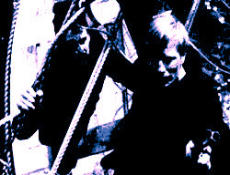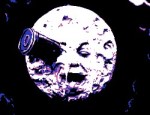Film Review
Erskine Childers' hugely influential 1903 novel
The Riddle of the Sands, reputed to
be the first modern espionage thriller in English fiction, is
masterfully transposed to the big screen in this slick and compelling
adaptation. Its director, Tony Maylam, would go on to garner
considerable acclaim for his 1988 BBC television film
Across the Lake and he brings a
similar finesse to this very distinctive nautical thriller. When
you say the words 'British spy thriller' you automatically think of the
James Bond movies. By this time, the Bond franchise was rapidly
running out of steam and ideas, with the latest entry,
Moonraker,
resorting to silly laser gun battles in space. Maylam's measured
period thriller offers something far more rich and satisfying, and the
only thing that lets it down are the moments when it becomes a little
too conscious of its own artistry.
The film's main selling point is Christopher Challis's breathtakingly
beautiful cinematography, which is at its most potent in those
sequences set in the misty shallows around the Frisian Islands.
Such stunning location photography gives the film a haunting poetic
quality and helps to anchor the drama solidly in the period in which it
is set, at the turn of the 20th century - a time of gallantry and
romance, when an individual's heroism could genuinely decide the fate
of his nation. There are a few action scenes, and these are all
exciting and meticulously choreographed, but where the film impresses
most is in the quieter scenes preceding these, which are charged with
an almost unbearable tension and anticipation.
Both of the photogenic lead actors, Michael York and Simon
MacCorkindale, had their careers blighted by some spectacular misfires
in the 70s and 80s, but here they are superbly well cast and deliver
flawless performances, assisted by the ever-lovely Jenny Agutter and a
suitably sinister Alan Badel. Made at a time when British cinema
was floundering in very shallow water,
The Riddle of the Sands stands out
as something special, an assured quality production that is as
compulsively entertaining as it is seductively stylish. Childers' novel could
hardly have hoped for a better adaptation.
© James Travers 2013
The above content is owned by frenchfilms.org and must not be copied.
Film Synopsis
In 1901, Charles Carruthers occupies a minor post in the British
Foreign Office. Towards the end of an uneventful summer,
Carruthers is slowly dying from boredom when he receives an unexpected
invitation from a former Oxford chum, Arthur Davies, to join him on a
yachting holiday in the Baltic. With nothing better to do,
Carruthers dashes off to meet up with his friend at a port on the north
coast of Germany. Carruthers is disappointed to learn that Davies
is planning to undertake his expedition in a tiny one-man sailing boat,
not the large crewed vessel he had been expecting. He is about to
head straight back to London when Davies reveals that an attempt was
made on his life during an earlier trip around the Frisian
Islands. Immediately prior to this incident, Davies had made the
acquaintance of a German sea captain, Dollmann, who is overseeing
salvage operations in the area. Intrigued, Carruthers decides to
stay and the two men begin investigating a site of covert activity on
one of the islands. To their surprise, they uncover an incredible
plot by the Germans to invade England's undefended east coast...
© James Travers
The above content is owned by frenchfilms.org and must not be copied.



